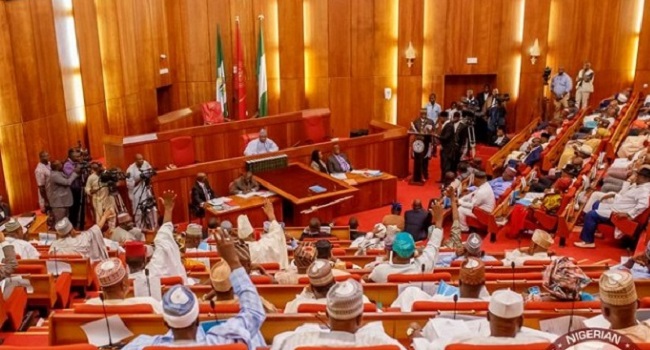News
2020 BUDGET: Senators query proposed VAT increase, others

The Nigerian Senate on Thursdays continued the debate on the general principles of the 2020 budget proposal presented to the National Assembly by President Muhammadu Buhari, with many of the lawmakers picking holes in the planned increase in Value Added Tax, implementation of the 2019 budget and allocation for debt servicing.
According to the lawmakers, the proposed increment in the VAT from 5 per cent to 7.5 per cent could cripple the activities of the small and medium enterprises.
In his contribution to the debate, the Deputy Senate Minority Leader, Senator Emmanuel Bwacha, accused the Senate of being guilty of condoning the executive’s flagrant disregard for the 2019 budget implementation.
Bwacha said: “The President presents budget every year but we do not take disciplinary measures expected to make the budget effective.
Read also: KOGI, BAYELSA POLLS: PDP says the people would vote against ‘corrupt’ APC
“It has become an annual ritual and we will still do it again. The President, by tradition, would lay the budget and whatever comes out of it is nobody’s business.
“I am saying this because since 1999, budget implementation has not reached 70 per cent. This is worrisome. We are discussing the 2020 budget estimates; is it fair to say we have a 2019 budget which has not been implemented? As we speak now, nothing has been done.
“We have the 2019 Appropriation Act and we are discussing the 2020 budget proposal. We refuse to address this aspect of our shortcomings. No nation moves forward without discussing what happened in the past.
“This is a worrisome development in our budget system. We do not take budgeting as a serious business. It may be difficult to achieve 100 per cent implementation but we could achieve a significant improvement in our budget implementation.”
Bwacha, while stressing the need to diversify the economy because the nation was still operating a mono economy, said the budget estimates before the parliament did not reflect any deliberate plan to diversify the economy.
He said: “The allocation to the agriculture sector does not really portray a nation that is prepared to diversify. We need to walk the talk if we really want to achieve a significant growth in our economy.”
In his contribution, Senator Christoper Ekpeyong described the VAT increase as anti- people, urging his colleagues in the red chamber to save the nation’s economy by looking at alternative means of funding the budget.
Senator Sandy Onor Ojang also argued against the proposed increase in VAT, adding that the increment was not in favour of the 2020 budget.
“If we look at the present VAT, other forms of taxation that are not mentioned openly are more than three, if you increase the VAT to 7.5 per cent today for an investor or a contractor who is coming, he will pay educational tax of one per cent, he will pay ITF of one per cent and he will pay NITTF of one per cent.
“These taxes are not mentioned. I am not in support of the VAT increase because already the VAT not mentioned is already over 9 per cent and if you now add them to 7.5 per cent, you are having 10.5 per cent as VAT in the country which would be a burden for us.”
In her own contribution, Senator Betty Apiafi condemned the poor implementation of the 2019 budget.
She said: “I have some misgivings with the budget proposal of 2020. With a debt portfolio of N2tn, debt service of 2.4tn higher than our capital budget of N1.18tn, I submit that we are not going to find funds to implement our capital budget.
“I would like us to reflect on 2019 budget where only a paltry sum of N294.6bn has been released for capital project as of September 2019, most worrisome is the fact that as of June 2019, budget expenditure was already in deficit of N1.35tn. This deficit is what is becoming a problem to implementing the capital budget.
“It is also important for us to know that in 2019, we spent N2.14 tn and in 2020, we are going to spend N2.45 tn for debt servicing. Debt servicing simply means absorbing the interests.
“Our loan portfolio as of today is about N24tn. We have not started paying but just servicing. This is actually becoming more worrisome because if we do not do something drastic, we will keep increasing our debt portfolio and decreasing the debt service.
“The President said the revenue performance of 2019 budget was only 58 per cent and that the budget underperformed because both the oil and non oil revenue were below target of 50 per cent as at June 2019.
“It is no longer a secret that before 2017, fuel subsidy budget used to be in the national budget and the National Assembly has the opportunity to monitor that cost.
“Since 2017, NNPC decided to absorb the fuel subsidy as a balance sheet item in their books and called it under recovery. So NNPC is now importing fuel, paying itself under recovery, what happens to PPPRA? That is the agency that is supposed to regulate petroleum pricing and determine the supply and distribution of petroleum products in Nigeria
“NNPC has usurped the powers of the PPRA as well as the powers of the National Assembly.”
Join the conversation
Support Ripples Nigeria, hold up solutions journalism
Balanced, fearless journalism driven by data comes at huge financial costs.
As a media platform, we hold leadership accountable and will not trade the right to press freedom and free speech for a piece of cake.
If you like what we do, and are ready to uphold solutions journalism, kindly donate to the Ripples Nigeria cause.
Your support would help to ensure that citizens and institutions continue to have free access to credible and reliable information for societal development.
























